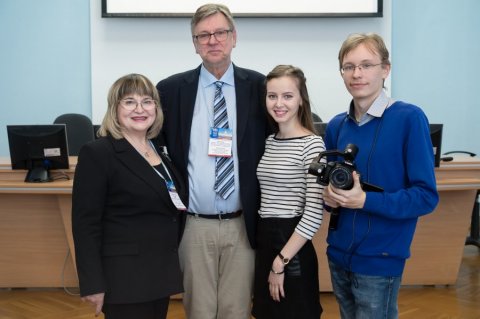March 18th through 24th the 4th International Scientific and Educational Forum entitled “Communication Leader of the 21st Century” was held at SUSU with the support from the European Journalism Training Association (EJTA).
Special attention in the forum program was paid to organising of professional master classes.
“About 30 master classes were held under various fields of the SUSU Institute of Social Sciences and Humanities: social science, philology, history, psychology, PR and advertising, and journalism,” shared Director of the Institute of Social Sciences and Humanities, Doctor of Sciences (Philology), Professor Elena Ponomareva. “Active and practicing specialists from Russia, Belgium, the Netherlands, and Greece shared their many-years’ experience in Russian and English, as well as held open lectures and training sessions for school pupils and students who participated in the forum. Such meetings with professionals help forming multi-purpose competences in the field of modern humanities knowledge, the ability to actively use those in practice, immerse in scientific and professional environment, and to a certain extent make the graduates become in demand in the international labour market and facilitate their building of successful career.”
The forum’s participants showed great interest in the master classes by the academics being member of the European Journalism Training Association (EJTA): president of EJTA Nico Drok, on the EUFACTCHECK: for Public Discussion Based on Facts; by Doctor of Sciences, Associate Professor of the Faculty of Journalism and Mass Communication at Aristotle University (Greece) Nikos Panagiotou, on the Problems and Challenges of Journalistic Education: the Role of Aristotle University in Providing for the Profession’s Needs; and the online master class on the international fact-checking technologies by Frederik Marain of Artesis Plantijn University College, Belgium.
.jpg)
.jpg)
“The forum training sessions by foreign moderators were successfully complemented by master classes of Russian media specialists,” shared Dean of the SUSU Faculty of Journalism, Head of the Department of Journalism and Mass Communication, Doctor of Sciences (Philology) Liudmila Shesterkina. “They shared on the technologies of social media promotion and on the latest trends in SMM; on sociological methods in marketing research; psychological types and efficient communication; on PR organising in the governmental sphere; targeted advertising and social media as a marketing tool. There were many relevant topics, and all of those were interesting.”
Live Streaming: from Preparation to Airing was the title of the master class excellently held by the producer of television projects of Traktor Ice Hockey Club and alumnus of the SUSU Faculty of Journalism Evgeny Mikhailov. He shared on the technical and creative aspects of organising and holding live streaming of big-scale sports events, as well as on the specifics of working as a TV producer.
.jpg)
.jpg)
.jpg)
Freelance: Working for Yourself, and Working on Yourself was the topic of the master class by a practicing designer, advertising specialist and a teacher at the Arta Centre of Design and Education Darya Maltseva. As a SUSU alumnus and a professional with diverse experience in marketing communication, she shared on the advantages and disadvantages of freelance, on the qualities of a successful freelancer, and on his principles of working with clients.
“For me freelance means being free, able to develop yourself, gain a lot of knew knowledge and experience, a possibility to choose interesting orders and earn good money. Today I have been sharing on how not to be afraid of working for yourself and developing a brand of your own. I liked to receive the feedback from the students, they asked me very good questions: how to work with problem clients, where to post your resume, and how to make yourself be seen,” stressed the alumnus of the SUSU Faculty of Journalism. “These are the very things young people worry about, and it’s great that our university helps them socialize. It was namely at SUSU that I obtained my initial knowledge in the field of design and marketing, and this helps me build my career successfully.”
Associate Professor at the Department of Journalism and Mass Communication, Anna Krasavina, and Director of the SUSU Production Photo Studio laboratory, Oleg Igoshin, held a master class on virtual (VR) journalism, talked about the use of VR technologies and sent participants into the virtual reality using a special headset.
Lecturer at the Federal School of Radio, Programme Director and the host at the morning show on Olimp radio, Sergey Sorokin helped students and school children figuring out peculiarities of on-air radio broadcasting during a master class entitled “On Air: how to talk to listeners on air.” Participants of the master class learned how radio hosts work on air, and what qualities they should possess.
“During this master class, I learned a lot of new things regarding the radio backstage. For example, I always wondered what a radio host should do if a person makes a call on air but his behaviour is not quite correct, and how to deal with awkward situations generally. Sergey Sorokin gave a very good advice: in any situation, it is important to stay calm and carry on the show,” said student of the Institute of Social Sciences and Humanities, Matvey Sholokhov.
.jpg)
.jpg)
The following events were also held within the programme of the Communication Leader of the 21st Century Forum: sociological practicum; awarding of winners of the Society Through My Own Eyes Contest; a roundtable discussion entitled “Representative Democracy: Questions for a Deputy”. Psychological Workshop of the Forum included a seminar entitled “How to Understand Each Other: Psychological Types and Efficient Communication”; a conference of historians entitled “Experience of Scientific Communication of the 21st Century: Youth Discussion Pedestal”; Media Planet festival of students and school children’s projects; Media PROFILE Congress of Advertising and Public relations. Big philological assembly of the Forum included the 12th International Science-to-Practice Conference of Young Scientists called “Language. Culture. Communication” as well as an international roundtable discussion entitled “Russian Language Art: Problems of Interpretation and Teaching”, traditional philological games and a new laboratory of theatre criticism opened on the occasion of the Year of Theatre.




